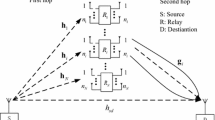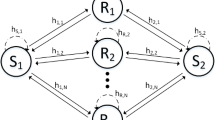Abstract
In this paper, the outage performance of opportunistic decode-and-forward cooperation is analyzed in independent but not necessarily identical Nakagami-m fading channels, where the impacts of relay selection criterion, relay number, channel fading severity parameter and the availability of the direct link are studied comprehensively. The closed-form expressions of outage probability in high signal-to-noise ratio region and the diversity order are derived for both asymmetric and symmetric scenarios. The analysis shows that the achievable diversity order is related to the channel fading severity parameter m, the number of relays K, the specific relay selection criterion N and the availability of the direct link. Take symmetric scenario for instance, the diversity order is m (K − N + 1) if the direct link blocks, otherwise the diversity order becomes m (K − N + 2). For asymmetric scenario, the diversity order depends on the particular value of fading severity parameter m in each link, and the expression is also derived. Simulation results validate the analysis of outage probability and diversity order.
Similar content being viewed by others
References
Sendonaris A., Erkip E., Aazhang B. (2003) User cooperation diversity—part I: System description. IEEE Transactions on Communications 51: 1927–1938
Sendonaris A., Erkip E., Aazhang B. (2003) User cooperation diversity—part II: Implementation aspects and performance analysis. IEEE Transactions on Communications 51(11): 1939–1948
Laneman J. N., Tse D. N. C., Wornell G. W. (2004) Cooperative diversity in wireless networks: Efficient protocols and outage behavior. IEEE Transactions on Information Theory 50(12): 3062–3080
Laneman J. N., Wornell G. W. (2003) Distributed space-time-coded protocols for exploiting cooperative diversity in wireless networks. IEEE Transactions on Information Theory 49(10): 2415–2425
Bletsas A., Khisti A., Reed D., Lippman A. (2006) A simple cooperative diversity method based on network path selection. IEEE Journal on Selected Areas in Communications 24(3): 659–672
Bletsas A., Shin H., Win M. Z. (2007) Cooperative communications with outage-optimal opportunistic relaying. IEEE Transactions on Wireless Communications 6(9): 3450–3460
Hwang K. S., Ko Y. C., Alouini M. S. (2008) Outage probability of cooperative diversity systems with opportunistic relaying based on decode-and-forward. IEEE Transactions on Wireless Communications 7(12): 5100–5107
Lee S., Han M., Hong D. (2009) Average SNR and ergodic capacity analysis for opportunistic DF relaying with outage over Rayleigh fading channels. IEEE Transactions on Wireless Communications 8(6): 2807–2812
Lee Y., Tsai M. H., Sou S. I. (2009) Performance of decode-andforward cooperative communications with multiple dual-hop relays over Nakagami-m fading channels. IEEE Transactions on Wireless Communications 8(6): 2853–2859
Maham B., Hjorungnes A. (2009) Asymptotic performance analysis of amplify-and-forward cooperative networks in a Nakagami-m fading environment. IEEE Communications Letters 13(5): 300–302
Datsikas C. K., Sagias N. C., Lazarakis F. I., Tombras G. S. (2009) Outage analysis of decode-and-forward relaying over Nakagami-m fading channels. IEEE Signal Processing Letters 15: 41–44
Liu, F., Zhang, X., Chen, Z., Wang, Y., & Yang, D. (2009). Performance measure analysis of amplify-and-forward relaying over non-identical Nakagami-m fading channel. In Proceedings Of 2009 IEEE international conference on communications (ICC) (pp. 1–6). June, 2009.
Suraweera H. A., Karagiannidis G. K. (2008) Closed-form error analysis of the non-identical Nakagami-m relay fading channel. IEEE Communications Letters 12(4): 259–261
Yang, Q., Kwak, K. S., & Fu, F. (2008). Outage performance of opportunistic amplify-and-forward relay under Nakagami fading. In Proceedings Of 2008 international symposium on communications and information. Technologies (ISCIT) (pp. 1–4). October 2008.
Yuan R., Zhang T., Zhang J., Huang J., Feng Z. (2010) Opportunistic cooperative communications over Nakagami-m fading channels. IEICE Transactions on Communications E93-B(10): 2812–2816
Duong T. Q., Vo N. Q. B., Zepernick H. J. (2009) On the performance of selection decode-and-forward relay networks over Nakagami-m fading channels. IEEE Communications Letters 13(3): 172–174
Chuai G., Zhang B., Liu X., Gao L. (2009) Outage probability of opportunistic decode-and-forward relaying over Nakagami-m fading channels. Journal of China Universities of Posts and Telecommunications 16(5): 46–49
Zhang N., Ge J., Gong F. (2010) Performances of opportunistic relaying system in Nakagami-m fading channels. Journal of South China University of Technology (Natural Science) 38(6): 24–28
Ikki, S. S., & Ahmed, M. H. (2009). On the performance of amplify-andforward cooperative diversity with the Nth best-relay selection scheme. In Proceedings of 2009 IEEE international conference on communications (ICC) (pp. 1–6). June, 2009.
Yang, C., Wang, W., Zhao, S., & Peng, M. (2010). Performance of decode-and-forward opportunistic cooperation with the Nth best relay selected. In Proceedings of the 6th international wireless communications and mobile computing conference (IWCMC) (pp. 1253–1257). June, 2010.
Karagiannidis G. K., Sagias N. C., Tsiftsis T. A. (2006) Closedform statistics for the sum of squared Nakagami-m variates and its applications. IEEE Transactions on Communications 54(8): 1353–1359
Vicario J. L., Bel A., Salcedo J. A. L., Seco G. (2009) Opportunistic relay selection with outdated CSI: Outage probability and diversity analysis. IEEE Transactions on Wireless Communications 8(6): 2872–2876
Gradshteyn I. S., Ryzhik I. M. (2007) Table of integrals, series and products. Academic Press, San Diego, CA
Author information
Authors and Affiliations
Corresponding author
Rights and permissions
About this article
Cite this article
Yang, C., Wang, W., Zhao, S. et al. Opportunistic Decode-and-forward Cooperation in Nakagami-m Fading Channels with Relay Selection. Wireless Pers Commun 66, 167–183 (2012). https://doi.org/10.1007/s11277-011-0331-6
Published:
Issue Date:
DOI: https://doi.org/10.1007/s11277-011-0331-6




